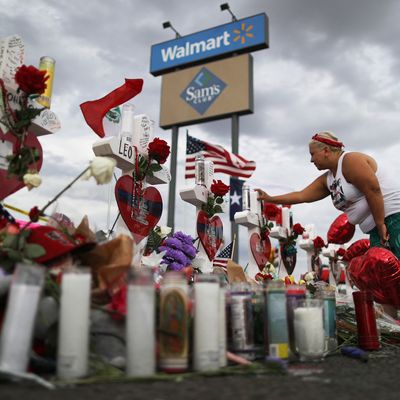
The reaction to mass shootings in the U.S. follows a pattern. Shock, grief, outrage, demands for action, and, finally, nothing. Will the weeks following the twin massacres in El Paso and Dayton be any different?
It doesn’t look likely. But if pressure from a fed-up populace does finally spark new legislation, many are hoping it will involve an expansion of the background-check system.
It’s what Democrats (and a few Republicans) in Congress want. It’s what 90 percent of Americans want. And, if you believe his tweets, it’s what President Trump wants. Here’s a look at the current proposals for new background-check laws, and what it would take to pass them.
Who’s proposing what?
Democrats are largely pushing for H.R. 8, the Bipartisan Background Checks Act of 2019, which passed the House in February by a count of 240-190, with eight Republicans voting “yay.” The bill would require background checks on all gun sales, including private sales and those made at gun shows. Only licensed gun dealers are currently required to conduct such checks.
Senate Majority Leader Mitch McConnell refused to take up H.R. 8 after it passed the House, but last weekend’s shootings have increased the pressure on him to revisit that decision. Within 24 hours of the massacre in El Paso, Senate Minority Leader Chuck Schumer and other leading Democrats called for McConnell to bring the Senate back to Washington to take up the bill. Congress is currently in recess for August.
Democrats would also like to see the Senate vote on H.R. 1112, which also passed the House by a 240-190 margin in February. The bill would extend by seven days the amount of time a gun dealer must wait to hear from the federal background-check system before proceeding with a gun sale. Sponsored by South Carolina representative Jim Clyburn, it has been dubbed the “South Carolina loophole bill.” In 2015, Dylann Roof, who would go on to kill nine at a Charleston church, was sold a gun after a dealer waited three days for a background check that never came. H.R. 1112 would force dealers to wait ten days before moving forward without a background check.
There are at least two Senate bills on background checks currently in the works as well. Senator Chris Murphy has a companion to H.R. 8, while Republican Pat Toomey and Democrat Joe Manchin are pushing a similar, but separate, background-checks bill.
President Trump, meanwhile, did not mention background checks in his public remarks on the shootings on Monday. Instead, he argued for the trampling of civil liberties to ensure the rights of gun owners.
Is there a chance of anything passing?
Probably not. McConnell responded to the calls to bring the Senate back to Washington with a statement that didn’t mention guns or background checks. Instead, he directed Republican leaders to focus on the suggestions Trump made, which include censoring video games and ramping up the use of the death penalty. The Senate Majority Leader also emphasized the need for “bipartisan” action, which is not how anyone would describe the politics around background checks, despite the handful of Repubublicans’ working with their Democratic colleagues on the issue.
Though the Manchin-Toomey proposal had a primary sponsor from each party, it failed in the Senate in both 2013 and 2015. It seems unlikely to fare much better there in 2019. Part of the reason why? The NRA hates the idea of expanding background checks.
The gun-lobbying group described H.R. 8 as “a feel-good bill at best, a failure-in-waiting at worst” and spent $1.6 million fighting it in the first half of the year.
Would background checks have stopped the El Paso or Dayton shooters?
It’s doubtful. Patrick Crusius, who killed nearly two dozen people in El Paso, bought his gun legally and had no criminal record. Connor Betts, the Dayton shooter, had a troubling history of threatening students at his school. But police have said that he too bought his guns legally and had nothing in his record that would have raised any concerns.
There is, however, some evidence that expanding background checks would have some effect on gun violence, as the Times notes:
A 2005 study by researchers at California State University, Chico, and New Mexico State University found that “states with less stringent background check policies also had higher rates of firearms homicides,” while a 2008 study by researchers at the Medical College of Wisconsin found that background checks were associated with a more than 20 percent drop in firearm suicide and homicide rates among adults age 21 and older.
In 2018, the FBI processed just over 26 million background checks. Nearly 100,000 firearms sales were stopped.





























